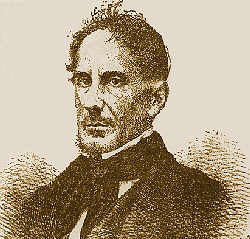Blog
Monthly Archive: April 2015
Consigning to the flames - the dirty sonnets of Giuseppe Belli
Posted on Saturday, April 18, 2015

Visitors to the Young Vic in London will know of the wonderful little arts book shop that sits opposite the theatre on The Cut. With half an hour to kill before a meeting, it was there, some years ago, that I stumbled across the obscure-sounding Sonnets by the 19th Century Roman poet Giuseppe Giaocchino Belli. Sounds dry and dusty right? You flick through a page or two in these virtuoso translations by Mike Stock, and to your surprise you come across lines like these:
Just listen to a mother talking crap:
the brat she drops has barely hit the ground
before she's bragging he's the best around,
and if you disagree you get a slap...
...To mum, the gruntings of this tit-mad junkie
surpass the sweet songs of a West End name.
The mothers of this world are all the same.
or
So having read the Gospel, there and then
that good and learned father plonked his rear
against the altarpiece, and - crystal clear -
explained the mysteries of faith to men,...
...In short, and from this sermon that we got,
to sum it up, to say it how it is,
it seems that mysteries are mysteries
or the infamous 'Philiosphic Café Proprietor':
The people of this world are much the same
as coffee beans inside the grinder's mill;
one's first, one's later and one's later still
but all are going down towards one doom..
The sonnets are written in Romanesco, a dialect spoken apparently by the original inhabitants of Rome, and still spoken today, it's the language of the street and Belli's project was to capture it in it's raw unadulterated form. The poems feel incredibly modern, in their observance of the minutiae of every day life (the nipple pain of a breast-feeding mum); their unabashed rudeness (a whole sonnet to different names of what my son would call 'privates'); a Jerry-Springer-the-Opera-approach to blasphemy (descriptions of the best confessional booth to grab an intimate moment); and their black-humour cynicism (as the coffee grinder excerpt above testifies).
But reading the brief biography of Belli that comes with the poems, it's fascinating to see what a compromised character Belli himself was. The bulk of his sonnets come from a period in his life in which he was lucky enough to find himself a wealthy wife, from which position of luxury he could afford to undertake the radical and daring work - brazenly criticizing authority and corruption, openly exposing society's most hidden and uncomfortable truths - that the sonnets represent. But when his wife died and he was forced to earn a living, he quickly turned coat and cosied up to the establishment, even re-joining and eventually becoming president of a the fusty writer's association "Accademia Tiberina" from which he had once flamboyantly resigned "for ever". He wrote strongly against liberal causes he had once subscribed to; and turned his back on his Romanesco project to the extent that he very nearly burned the entire collection.
But the biographer argues that it is Belli's compromised character that allowed him to see the frailty in others.
"it is the morals culpability that Belli shares with his targets, his lack of angst in the face of moral contradiction, that endows him with the power to portray the compromised people of Rome and capture their complex humanity"
This confirms one of my many slowly-developing pet-theories, that in some cases at least, the work for which an artist is best remembered emerges from a part of the artist, with which the artist themselves is not entirely comfortable. I guess there is an element in all art that shocks - if something is a truly new vision it will take society a while to adjust to it; but this takes that idea a stage further - it is the idea that the vision is a shock to the artist themselves. How are we, as artists, supposed to reconcile these opposing voices within ourselves, and to recognise that our best work may sometimes be that which we are most tempted to guiltily consign to the flames?
Archive
2024: Jan Feb Mar Apr May Jun Jul Aug Sep Oct Nov Dec
2023: Jan Feb Mar Apr May Jun Jul Aug Sep Oct Nov Dec
2022: Jan Feb Mar Apr May Jun Jul Aug Sep Oct Nov Dec
2021: Jan Feb Mar Apr May Jun Jul Aug Sep Oct Nov Dec
2020: Jan Feb Mar Apr May Jun Jul Aug Sep Oct Nov Dec
2019: Jan Feb Mar Apr May Jun Jul Aug Sep Oct Nov Dec
2018: Jan Feb Mar Apr May Jun Jul Aug Sep Oct Nov Dec
2017: Jan Feb Mar Apr May Jun Jul Aug Sep Oct Nov Dec
2016: Jan Feb Mar Apr May Jun Jul Aug Sep Oct Nov Dec
2015: Jan Feb Mar Apr May Jun Jul Aug Sep Oct Nov Dec
2014: Jan Feb Mar Apr May Jun Jul Aug Sep Oct Nov Dec
2013: Jan Feb Mar Apr May Jun Jul Aug Sep Oct Nov Dec
2012: Jan Feb Mar Apr May Jun Jul Aug Sep Oct Nov Dec
2011: Jan Feb Mar Apr May Jun Jul Aug Sep Oct Nov Dec
2010: Jan Feb Mar Apr May Jun Jul Aug Sep Oct Nov Dec
2009: Jan Feb Mar Apr May Jun Jul Aug Sep Oct Nov Dec
2008: Jan Feb Mar Apr May Jun Jul Aug Sep Oct Nov Dec
2007: Jan Feb Mar Apr May Jun Jul Aug Sep Oct Nov Dec
2006: Jan Feb Mar Apr May Jun Jul Aug Sep Oct Nov Dec

